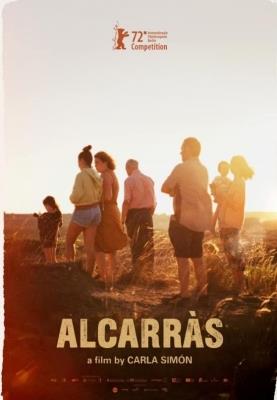(MENAFN- IANS)

Los Angeles, Feb 17 (IANS) Spanish director Carla Simón has won the Golden Bear, the top prize at the Berlin Film Festival, for her second feature 'Alcarràs', a moving drama about a Catalan farming family facing eviction from their land. She received the prize from jury president M. Night Shyamalan, capping a strong night for female filmmakers.
'Alcarràs' was one of the last Competition titles to unspool at the festival, but emerged as a hot favourite for the Bear following yesterday's premiere, with unanimous critical adoration for her unassuming but emotionally stirring film, featuring an ensemble of entirely non-professional actors, reports variety.com.
With Simón's Golden Bear following a Venice Golden Lion win for French director Audrey Diwan's abortion drama 'Happening', which in turn followed her compatriot Julia Ducournau's Palme d'Or triumph at Cannes for 'Titane', this marks the first time in history that the reigning winners of the most prestigious three prizes on the international festival circuit are all women.
Shyamalan's jury, which also included newly minted Oscar nominee Ryusuke Hamaguchi and actor Connie Nielsen, rewarded a diverse range of films across the remaining Competition prizes, with only the German political satire 'Rabiye Kurnaz vs. George W. Bush' taking two awards: Best Screenplay and Best Leading Performance for star Meltem Kaptan. In the second year of the festival's new policy of gender-neutral acting honors, female performers again took both the leading and supporting categories, with the latter going to Indonesian actor Laura Basuki for Kamila Andini's lyrical political drama 'Before, Now and Then (Nana).'
The second-highest honour, the Grand Jury Prize, went to South Korean helmer Hong Sangsoo for his wry, conservational comedy of manners 'The Novelist's Film' — on which the prolific multi-hyphenate takes solo directing, writing, producing, lensing, editing and scoring credit. He accepted the prize together with his personal and professional partner, Kim Minhee, who takes a leading role in this story of artists working out their creative blockages together. This was his third consecutive year in Competition at Berlin: Two years ago, his similarly droll 'The Woman Who Ran' won him the Best Director prize.
This year, as it happens, that award went to a close friend and champion of Hong's, veteran French auteur Claire Denis, for her sensually charged relationship drama 'Fire'.
The festival's Jury Prize, meanwhile, went to another female filmmaker, at the opposite end of her career: Mexican freshman helmer Natalia Lopez Gallardo for her debut feature 'Robe of Gems'.
The Competition winners were rounded out by an Outstanding Artistic Contribution Award for Cambodian filmmaker Rithy Panh's experimental dystopian vision 'Everything Will Be OK' and a special mention for Swiss director Michael Koch's austere Alpine tragedy 'A Piece of Sky.'
In the festival's other juried sections, female filmmakers swept the top prizes. Austrian docmaker Ruth Beckermann was a surprise Best Film winner in Encounters — Berlinale's second-most prestigious competition, founded in 2020 — for her non fiction film 'Mutzenbacher', an exploration of masculinity, sexuality and modernist Viennese literature.
Iraqi newcomer Kurdwin Ayub won the Best First Feature award — a prize considering debuts from multiple sections of the festival program — for her film 'Sonne,' a dynamic study of Muslim feminist rebellion in Austria. Russian director Anastasia Veber won the the short film award for 'Trap,' while the festival's documentary prize went to the Myanmar Film Collective — an anonymous group of dissident filmmakers in Burma, for their 'Myanmar Diaries,' shot in the aftermath of the territory's February 2021 military coup.
The awards ceremony concludes the press portion of this year's Berlinale, which was structurally compressed this year due to Covid, with all films in the programme premiering in the fest's first seven days — while the remainder of the event, which ends on Sunday, will be made up of repeat screenings for the public.
In the festival's first full in-person edition since 2020, the pandemic was still a prominent presence in proceedings, with daily testing required for press attending socially distanced screenings, and a palpably diminished crowd circulating around an unusually quiet Potsdamer Platz. Even Isabelle Huppert, the festival's honorary Golden Bear winner this year, was a pandemic casualty, ultimately unable to attend yesterday's tribute ceremony in person after testing positive for the virus.
--IANS
dc/
MENAFN17022022000231011071ID1103715860
Legal Disclaimer:
MENAFN provides the information “as is” without warranty of any kind. We do not accept any responsibility or liability for the accuracy, content, images, videos, licenses, completeness, legality, or reliability of the information contained in this article. If you have any complaints or copyright issues related to this article, kindly contact the provider above.